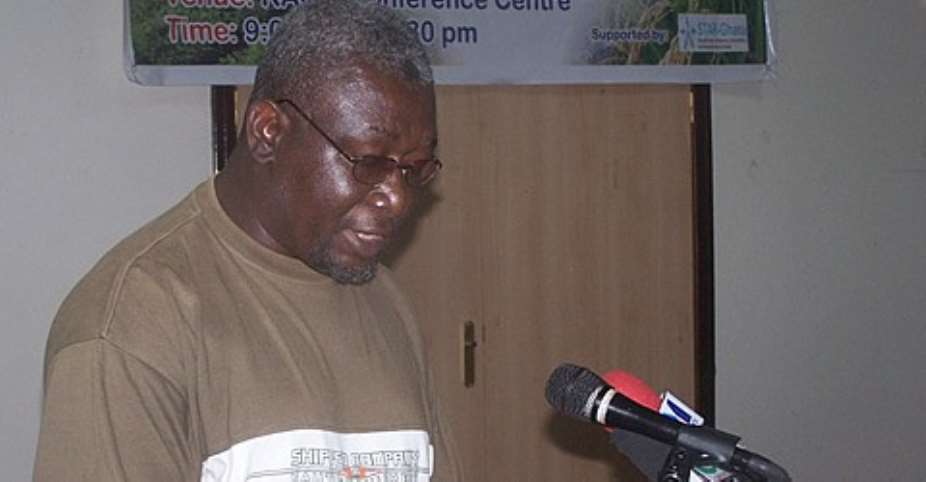The Peasant Farmers Association of Ghana is raising red flags over what they say are government's plans to reduce subsidies on fertilizers for small scale farmers this farming season.
They fear if the government goes ahead with the planned subsidy reduction, the country's efforts at ensuring food security will be rolled back.
The president of the association, Mr Mohammed Adam Nashiru said this at a Policy dialogue on fertilizer subsidy in Accra.
He said even with the government subsidy, peasant farmers have often resorted to loans to be able to procure the essential farm input.
Mr Nashiru said any removal whether whole or part of the subsidy will be a retrogressive action especially at a time when fertilizer prizes are increasing on the international market.
“We are aware of the pressure from donors and financial institutions to discontinue the subsidies to our farmers while they continue to subsidize and bring in their food products with which our local products cannot compete thus stifling our agricultural growth,” he said.
Mr Nashiru consequently appealed to the government and parliament to, in spite the pressure, “gather the political will and do what is best for farmers of this country.”
However, an Economist at the Finance Minister, Dr Mawuli Gaddah, who represented Finance Minister Kwabena Duffour at the forum, said the fears of the peasant farmers were unjustified.
He said the facts available to him point to the contrary.
The Chairman of the Parliamentary Select Committee on Agriculture, Dr Alhassan Ahmed Yakubu, said PFAG's role in prompting the government on what was happening to the subsidy programme was crucial for the success of the programme.
He said because subsidies don't last forever, monitoring their application and ensuring that the subsidy is achieving its purpose was highly commendable.
As a consequent, Dr Yakubu called for targeting in the application of subsidies. For him, not all farmers deserve subsidies.
He also stressed the need for research institutions in the country to aggressively conduct research to identify modern, improved varieties that will produce maximum output with minimal application of fertilizers.
“If we are applying fertilizer to the same varieties that we have been producing in the last 30 to 50 years, obviously we [won't get] the right output,” he stated.
Dr Yakubu, who is also the Member of Parliament for Mion in the Northern Region, bemoaned the moribund state of irrigation infrastructure in the country, insisting that “If you apply inputs and you cannot regulate the weather to give you the desired output, believe me, it is a real struggle.”
To ground his argument, the MP cited India which he said “invested in irrigation infrastructure to the point where today Indian agriculture is 49 per cent irrigated and 51 per cent rain fed.”
This together with research, he maintained, has made India one of the most food secure countries in the world.
The Programme Coordinator of PFAG, Mrs Victoria Adongo emphasised the need for the subsidy distribution network to be widened.
Currently she said rural farmers, especially women, were unable to access subsidized fertilisers because of the distances they have to travel to reach distribution centres.
Mrs Adongo said the subsidy policy must help members of the Ghana Agricultural Inputs Dealers Association to bring the product to the doorstep of rural farmers who need it most.
In addition, she said the situation where the subsidy was removed at certain times in the year was negatively affecting especially dry season farming, stressing the need for the subsidy to be made available all-year-round.
A former Agric Minister, Mr Ernest Debrah agreed.
Story by Ghana l Malik Abass Daabu/Myjoyonline.com





 Former Kotoko Player George Asare elected SRC President at PUG Law Faculty
Former Kotoko Player George Asare elected SRC President at PUG Law Faculty
 2024 elections: Consider ‘dumsor’ when casting your votes; NPP deserves less — P...
2024 elections: Consider ‘dumsor’ when casting your votes; NPP deserves less — P...
 You have no grounds to call Mahama incompetent; you’ve failed — Prof. Marfo blas...
You have no grounds to call Mahama incompetent; you’ve failed — Prof. Marfo blas...
 2024 elections: NPP creates better policies for people like us; we’ll vote for B...
2024 elections: NPP creates better policies for people like us; we’ll vote for B...
 Don’t exchange your life for wealth; a sparkle of fire can be your end — Gender ...
Don’t exchange your life for wealth; a sparkle of fire can be your end — Gender ...
 Ghana’s newly installed Poland train reportedly involved in accident while on a ...
Ghana’s newly installed Poland train reportedly involved in accident while on a ...
 Chieftaincy disputes: Government imposes 4pm to 7am curfew on Sampa township
Chieftaincy disputes: Government imposes 4pm to 7am curfew on Sampa township
 Franklin Cudjoe fumes at unaccountable wasteful executive living large at the ex...
Franklin Cudjoe fumes at unaccountable wasteful executive living large at the ex...
 I'll 'stoop too low' for votes; I'm never moved by your propaganda — Oquaye Jnr ...
I'll 'stoop too low' for votes; I'm never moved by your propaganda — Oquaye Jnr ...
 Kumasi Thermal Plant commissioning: I pray God opens the eyes of leaders who don...
Kumasi Thermal Plant commissioning: I pray God opens the eyes of leaders who don...
